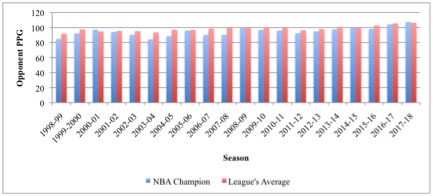Alabama’s legendary coach Paul “Bear” Bryant was talking about football when he coined the phrase “defense wins championships,” but his words are applicable to many other sports as well. Basketball coaches, in particular, have always stressed the importance of having a solid defense because they recognize that it can lead to more scoring opportunities and, consequently, greater chances of victory. But professional basketball players and coaches have become less defensive-minded in recent decades, and NBA champions are now known for their offensive talent rather than their defensive prowess. That being said, is the idea that defense wins NBA championships outdated?
Opponent PPG
It goes without saying that, while on defense, a team’s objective is to prevent its opponent from scoring. The given chart shows how well former NBA champions achieved this goal by comparing the average number of points scored against them in a regular season game with the league’s average number of points scored against a team in a regular season game.

Notice that 18 out of the last 20 NBA champions had an opponent PPG statistic that was less than the league’s average opponent PPG statistic, meaning that the champions allowed fewer points to be scored against them in a regular season game than the “typical” NBA team. Additionally, the tables below reveal that in the last 20 years, 45% of championship teams were ranked in the top 5 for opponent PPG and 70% were ranked in the top 10 (the lower the opponent PPG, the higher the rank). This goes to show that NBA champions are better at limiting their opponents’ point totals than most teams in the league.


Opponent FG%



The opponent FG% statistic shows what percentage of a team’s opponent’s field goal attempts were actually made in a game, and we see that every NBA champion since 1999 has had an opponent FG% below the league’s average opponent FG%. Even more telling is the fact that 6 of the last 20 championship teams had the lowest opponent FG% in the league, 13 were ranked in the top 5, and 18 were ranked in the top 10 (the lower the opponent FG%, the higher the rank). We can conclude that NBA champions usually have one of the lowest, if not the lowest, opponent field goal percentages in the league, so they excel at successfully disrupting shooters on opposing teams.
Opponent Turnovers
Players who face a lot of defensive pressure cannot execute their offensive schemes easily and are more likely to make mistakes and turn the ball over. Therefore, it is logical to assume that teams with strong defenses have more opponent turnovers, more possessions/opportunities to score, and greater odds of victory.



Surprisingly, only 9 of the last 20 NBA champions had more opponent turnovers than the league’s average number of opponent turnovers, and the difference between the champion’s and the league’s average number of opponent turnovers was insignificant each season. Also, the average rank of the champions based on opponent turnovers is 15, so forcing turnovers does not seem to be characteristic of NBA champions.
Defensive Rebounding
Rebounding is a critical part of defense because it helps minimize the number of opportunities that a competitor has to score. For each of the last 20 seasons, the chart below reveals the champion’s and the league’s average defensive rebound percentage (DRB%), which is the percentage of available defensive rebounds that a team’s defense actually secured.



The chart shows that 13 of the NBA champions had greater defensive rebound percentages than the league’s average defensive rebound percentage, but only by about 1.6%. Additionally, in the last 20 years, 30% of championship teams were ranked in the top 5 for DRB% and 60% were ranked in the top 10. We can conclude that championship teams are only slightly above-average when it comes to defensive rebounding, but that is sufficient because defensive players secure a large majority (approximately 70-80%) of potential defensive rebounds anyway.
Conclusion
The quality of a team’s defense heavily influences its ability to win games and championships, but certain aspects of defense are more important than others. In particular, teams hoping to win the NBA title should focus more on minimizing their opponents’ point totals and field goal percentages and less on forcing turnovers and securing defensive rebounds. Thus, a more accurate version of Bear Bryant’s quote might be “Parts of defense win championships,” at least in the context of professional basketball.
Sources
https://www.basketball-reference.com
https://creativecommons.org/licenses/by-sa/2.0/
About the Author
Courtney Williams graduated summa cum laude from Berry College (GA) in 2017. She earned a bachelor’s degree in mathematics, and she wants to use her knowledge of statistics, probability, and more advanced mathematics to help sports organizations make good business- and player-related decisions.
